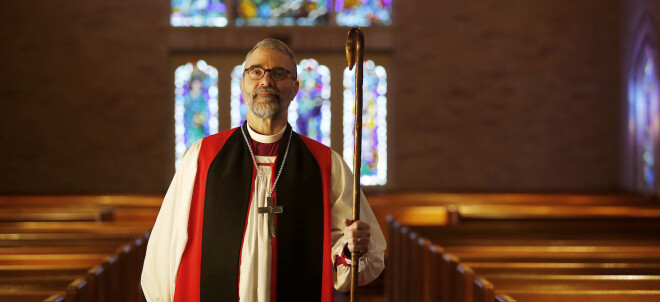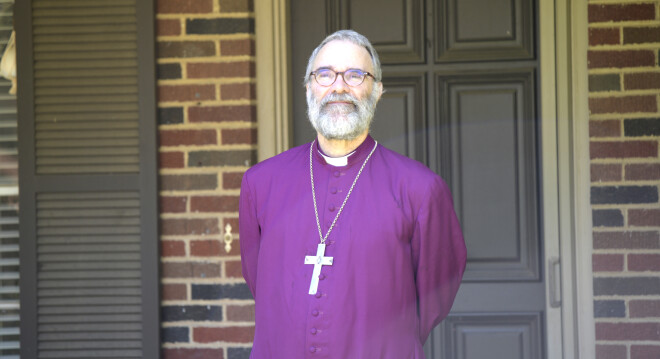Irenicon

It is easy to feel ourselves to be pawns, or statistics, or leaves blown about in the wind. We seem to be subject to larger and impersonal forces, for the most part working to our detriment. One type is the virus, another deep and disturbing social ills. In the midst of all this society, usually stolid and taken for granted, seems more tenuous than usual. In the moments when we feel the floor boards soggy under our feet, we are unsettled. But there is a moment of clarity here too: in post-modern society we often assume that the prevailing and decisive forces are secular or political or material, and we subject to them; perhaps religion helps people bear up in the midst of them. Perhaps in this sense that we were deemed 'essential' in the recent lockdown period.
But if we think harder, we realize the truth is quite the opposite. Never has our faith seemed more essential, our vocation more decisive for society as a whole. Never has it needed more a voice that is reliable above the din, or a home base to which people otherwise at odds could repair. We are indeed, as the Epistle To Diognetus in the second century said, 'the soul of society.' And in keeping with this surprisingly rediscovered vocation, it becomes incumbent on us to offer a distinctively Christian, distinctively theological, distinctively Biblical word for our struggling neighbors. Nothing is more politically pertinent than for us to be persistently and un-politically (and counter-culturally) the Church. We are offering in effect a contemporary theology of the Church and its mission, an important way to proclaim Jesus as Lord in this moment in our history.
- Matthew 5:44, ‘but I say to you, love your enemies, and pray for those who persecute you... .’ How hard and impractical Jesus is! But how pertinent. In this riven, angry, distrustful moment, His voice invades the partisan trenches. And this verse is not a suggestion, it is an imperative. The parable of the Good Samaritan means to work itself out in your life.
- Ephesians 2:14, 'He is our peace, who has made of the two groups one and broken down the dividing wall of enmity.' We have a painful and guilt-ridden racial history in America. But Jesus is already our peace, the wall already broken down. Always, but especially at this moment, we have to display in our lives to our neighbor who we already are, one people, one diverse Body. How very much does our society need to see this, the reality of the Church of Jesus Christ who has brought down that wall!
- Ephesians 4:15, ' ... speaking the truth in love... .' But how does this unity go with the hard work of confronting injustice and naming it? By beginning with me, with the things Ineed to leave at the altar to seek reconciliation. This is not wallowing in guilt, but rather walking the forgiven disciples' path following the footsteps of Jesus crucified, risen, reigning over all this.
- Matthew 25:37, 'Lord when did we see you hungry and feed you?' We are in the beginning of a time of pandemic wrought crisis in terms of palpable human need, not in some distant land but up close. We are striving to answer this call, and will need to continue to do so. St.James reminds us that the Gospel of grace is inextricably bound up with what Catholic tradition calls 'the works of corporal mercy.' You have heard, and you are responding.
- Joel 2:28, 'And it shall come to pass afterward, that I shall pour out my Spirit on all people ... .' We have no power, of our own accord, to bringrenewal we need to pass on society, of the Church, or ourselves. But we cancall on the Holy Spirit, blowing where the Spirit will. And we are encouragedthat periodically, repeatedly, surprisingly, in American history we have beenrenewed, revived, and greatly awakened. We are as the Church the sign inthe world of this hope and confidence.
- John 18:37, 'Everyone who hears my voice listens to the truth.' And remember that Pilate has just uttered his cynical, post-modern 'what is truth?' In response our Lord stands as Himself the truth. What age has been more mendacious than ours with its technological hall of mirrors? Which, more hungry to know whose word is truth, to find a plumb line?
- Jeremiah 29:7 'Seek the prosperity of the city to which I have sent you .. .' This includes those who labor for our health, our public safety, our right tospeak, those who advocate for change, and for those whose daily labors allowus to survive these days. Each carry risk. We are obliged every morning tointercede for them all in these hard days.
- Revelation 2:29, 'Whoever has ears, hear what the Spirit is saying to the Church ... .' When have we felt more confined and disoriented? Howsurprising that this is the moment for us as Church to recall who we are inthis moment, and to stand and to arise! And how unsurprising in a religionof grace that our moment of seeming marginality and powerlessness shouldalso a moment in which society should come realize itsreal need ... forpeace,solidarity, honesty, courage to carry on, humility, and veracity,things it cannot fabricate these for itself., and ultimately its need of the Onethrough whom they come. Nor can we fabricate these ... Of our own accord wemight be inclined to flee, but who else has the words of life? These words, ourcommon inheritance, of all Christians together, bestowing on us no particularworldly power, are in fact, and increasingly clearly, are the one thing needfulfor our moment and our world.




